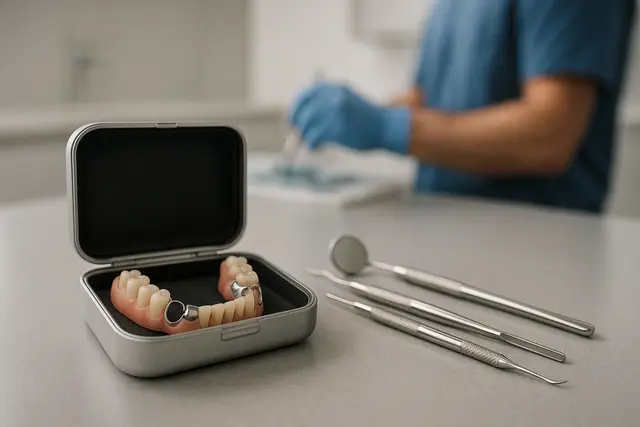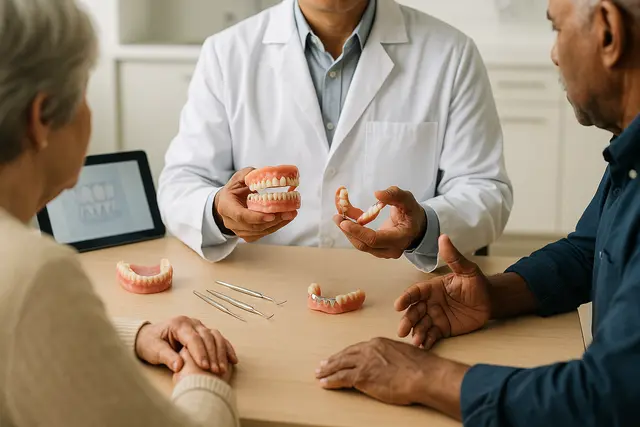Prosthodontics
6 min read
Mar 28, 2025
How Long Do Dental Implants Last? 5 Factors Affecting Longevity
Dental implants are a long-term solution for missing teeth, designed to function like natural teeth. With proper care, they can last for decades. Their lifespan depends on various factors, including oral hygiene, lifestyle choices, and the quality of the implant itself.

What is a Dental Implant Anyway?
When you’re considering dental implants, one of the first questions that pops up is this: How long do dental implants last? And it’s a great question, especially when you’re about to invest in your smile, and let’s be real, your confidence too. Dental implants are more than just a fix for missing teeth. They’re a long-term solution designed to look, feel, and function like your natural teeth.
But let’s cut through the polished brochures and get into the real stuff. Yes, implants can last a lifetime, but there’s a big “if” hiding in that statement. The truth? Several things impact how long your dental implant lasts. Let’s talk about them.
A dental implant is not just a replacement tooth. It’s a high-tech tooth root made of titanium (or zirconia dental implants, if you’re fancy) that your dentist literally places into your jawbone. This anchor then holds a dental crown, bridge, or other artificial teeth securely in place. Unlike dentures, implants don’t slip around like they’re trying to win a dance contest. And unlike a dental bridge, they don’t require the grinding down of nearby natural teeth. That’s a win for your overall dental health.
Dental implants are considered the gold standard in tooth replacement because they fuse with your jawbone through a process called osseointegration. This fusion gives your replacement tooth incredible stability, like, “chew-on-a-steak-with-confidence” kind of stability. But even the most advanced dental implant can last only as long as the conditions around it stay ideal.
How Long Do Dental Implants Last?
Here’s the honest answer: it depends. The average lifespan of dental implants falls somewhere between 10 to 30 years, but many dental implants can last a lifetime with the right care. Others? They may only last 5 to 10 years if they’re ignored or mistreated. Most commonly, the crown attached to the implant may need to be replaced before the implant itself, due to normal wear and tear.
Success rates are encouraging, though. The survival rate of dental implants hovers around 95% after 10 years. That’s higher than a lot of other dental work. Still, implants don’t come with a guarantee. So, let’s look at what really affects how long dental implants last.
1. Your Dental Hygiene Habits Matter More Than You Think
If you're brushing like your toothbrush is on autopilot, you might want to rethink your routine. Excellent dental hygiene is crucial to the success of a dental implant. Just like natural teeth, implants need good dental care, daily brushing, flossing, and yes, regular dental check-ups.
Without this, bacteria can build up around the implant and cause inflammation in the gums. That leads to peri-implantitis (fancy word for gum disease around the implant), which can cause an implant to fail. The bottom line? You can’t slack off just because your tooth isn’t real.
2. Location, Location, Location
Believe it or not, the location of your implant can also affect how long it lasts. Implants near the front of the mouth may not take as much biting pressure as those in the back, so they may last longer. However, they’re also more exposed to movement and trauma.
Implants supporting molars in the back? They handle all the grinding, crunching, and chewing. So they experience more stress and may not last as long. Tiny movements of the implant, especially in the early stages after placement, can also lead to implant failure if not properly managed.
3. Your Dentist’s Skill is a Big Deal
The success of a dental implant doesn’t rest on the product alone, it’s also about the artist placing it. A highly experienced implant dentist will evaluate the bone structure, gum health, and overall dental hygiene before ever scheduling the procedure.
Proper implant placement ensures the implant is positioned at the right depth and angle for long-term success. Bad placement? That could cause implant failure down the line. So if you’re considering dental implants, see the best implant dentist you can find, this isn’t the time for bargain hunting.
4. The Type of Dental Implant (Yes, It Makes a Difference)
There are many dental implant options, and not all are built equally. Traditional implants are the most commonly used and are known for their durability. However, mini dental implants, while faster to place and more affordable, may not last that long.
Mini implants don’t fuse with the bone in the same way and may be more prone to shifting over time. While they’re a great option for some patients, they typically may not last as long as full-sized implants.
Material matters too. Zirconia dental implants are becoming popular due to their biocompatibility and aesthetics, especially for people allergic to metals. But titanium remains the most trusted and well-studied material used in implant placement.
5. Lifestyle Habits That Can Make or Break It
You guessed it, smoking is a big no-no. It slows healing after dental implant surgery and increases the risk of dental implant failure. Even worse, it can cause implant failure years later by damaging the gums and bone around the implant. Grinding your teeth (a.k.a. bruxism), poor diet, and ignoring regular dental appointments? Yep, all of those can lead to implant trouble.
On the flip side, staying on top of dental hygiene, following post-op instructions, and seeing your dentist regularly? That’s how you make your dental implants last, and last even longer than the average.
So, What Causes an Implant to Fail?
Dental implant failure isn’t super common, but when it happens, it’s often due to a few usual suspects: poor dental hygiene, smoking, existing gum disease, bone loss, or improper implant placement. Infections around the implant, overloading the tooth, or neglecting regular dental care can all lead to implant failure.
There’s also a genetic element to how your body heals and fuses with the implant. Sometimes, even with perfect hygiene and expert care, the body just doesn’t accept the implant. But again, that’s rare.
Can Dental Implants Really Last a Lifetime?
Yes, dental implants can last a lifetime, especially when placed correctly, maintained well, and cared for like your natural teeth. But let's be honest: not all implants need to last forever to be worth it. Even if your implant lasts 15 or 20 years, that’s a pretty impressive run compared to most dental work.
Just remember: implants need TLC. If you treat them like natural teeth, visit your dentist regularly, and don’t make them work overtime (like chewing ice or opening beer bottles, don’t do it), there’s a good chance your implants will last that long, maybe even last longer.
If You’re Considering Dental Implants...
If you’re missing teeth and tired of the slipping dentures or avoiding smiling in photos, dental implants are an excellent choice. They provide stability, comfort, and confidence, plus, they look just like natural teeth.
Whether you're looking for a single dental implant or implants to replace several missing teeth, it's worth having a consultation to learn if you qualify for dental implants. Ask questions about the dental implant procedure, understand the type of dental materials available, and talk about the benefits of dental implants compared to bridges or dentures.
It’s also smart to ask about the rate of dental implants at your chosen clinic and if they’ve had a history of complications. The more informed you are, the better decisions you’ll make, not just about the look of your smile, but the long-term health of it too.
Final Thoughts
So, how long do they last? With good dental hygiene, smart lifestyle choices, and regular check-ups, implants can last a lifetime. But even if they don’t, they’ll still give you many years of chewing, smiling, and living with confidence.
And hey, you’ve got questions about dental implants, or you’re considering dental implants but still feeling unsure, book that consultation. It’s a step worth taking. After all, this isn’t just about fixing teeth, it’s about restoring your bite, your smile, and a little piece of joy that tooth loss may have taken away.
How Long Do Dental Implants Really Last?
Dental implants can last a lifetime with excellent care, though many average 10 to 30 years. The implant post itself is built to be permanent, but the attached crown may need replacement after 10–15 years due to normal wear. Good hygiene, regular dental visits, and avoiding harmful habits play a big role in longevity.
What Factors Affect the Lifespan of a Dental Implant?
Several key factors impact how long an implant lasts: your oral hygiene routine, where the implant is placed in your mouth, your dentist’s experience, and whether you smoke or grind your teeth. Implants in the back of the mouth endure more biting force and may wear faster, while skilled placement and good daily care help extend their life.
Can Dental Implants Fail Over Time?
Yes, though implant failure is uncommon. Most issues come from poor hygiene, smoking, untreated gum disease, or bone loss. Sometimes, the body simply doesn’t integrate the implant well. If pain, looseness, or infection occurs around the implant, it’s important to contact your dentist immediately to avoid long-term complications.
Are Dental Implants Worth It Even If They Don’t Last Forever?
Absolutely. Even if an implant lasts 15–20 years, it can outperform other dental solutions in comfort, function, and appearance. Implants protect your jawbone, preserve nearby teeth, and feel like natural teeth, making them a worthwhile long-term investment for most people.
Read Next
Related Posts

Prosthodontics
Permanent Partial Dentures Overview: Your Guide to Long-Term Tooth Replacement
Missing teeth can affect more than just your appearance, they can impact how you eat, speak, and feel about yourself. For those who still have some healthy teeth remaining, permanent partial dentures offer a reliable and natural-looking solution to restore both function and confidence. This guide breaks down everything you need to know about them, from types and benefits to how they’re made and maintained.
5 min read
Nov 04, 2025

Prosthodontics
Dentures vs. Partial Dentures Pros and Cons: Helping You Make the Best Choice
Tooth loss can impact everything from your self-confidence to your ability to enjoy your favorite foods. Fortunately, modern dentistry offers practical solutions that restore both function and aesthetics. Two of the most common options are full dentures and partial dentures, each with its own advantages and limitations.
5 min read
Nov 03, 2025

Prosthodontics
Differences Between Zirconia and Acrylic Dentures: Benefits, Drawbacks, and Tips
Choosing between zirconia and acrylic for dental implants can feel overwhelming, especially when both materials offer unique advantages. This guide breaks down the essential differences, benefits, and limitations of each option to help you make a more confident, informed decision about your dental restoration journey.
5 min read
Nov 03, 2025
Don’t have time to research every dentist around you?
See why 30k+ patients trusted us